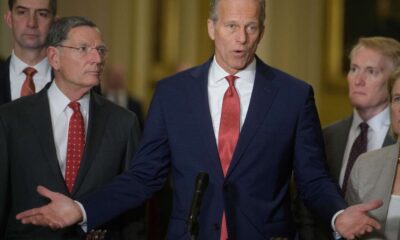Health
Trump’s Free IVF Promise Falls Short Amid Conservative Lobbying

Last week, a significant announcement by former President Donald Trump revealed a policy shift regarding fertility treatments, which many in the pro-life movement oppose. The announcement, however, did not meet the expectations set by Trump’s earlier promise to provide free in vitro fertilization (IVF) services. This decision comes after intensive lobbying efforts by social and religious conservatives who have been influential in shaping the narrative around reproductive health policies.
In a press conference on March 15, 2024, Trump outlined a new policy framework aimed at addressing family planning but notably omitted the commitment to free IVF, which had been a point of contention among conservatives. The move has sparked criticism from various sectors, particularly among those who had hoped for a more comprehensive approach to reproductive health that included financial support for fertility treatments.
The pro-life movement has historically been wary of IVF and similar technologies, viewing them as contrary to their beliefs regarding the sanctity of life. Lobbying efforts from Christian conservative groups have consistently aimed to limit access to such treatments, arguing that they can lead to the destruction of embryos. This resistance played a significant role in shaping Trump’s recent policy decisions.
In the lead-up to the announcement, conservative activists had ramped up their advocacy, urging Trump to prioritize policies that align with their views on family and life. Despite these efforts, the absence of free IVF in the new policy raises questions about the extent of conservative influence within Trump’s administration.
Analysts suggest that Trump’s decision reflects a complex balancing act between appealing to his base and addressing broader reproductive health issues. While the pro-life movement has maintained significant momentum, the lack of a concrete commitment to free IVF might signal challenges ahead for conservative leaders who seek to unify their supporters around a consistent reproductive health agenda.
In the aftermath of the announcement, reactions have varied. Supporters of the pro-life movement expressed disappointment, emphasizing that free IVF could have been a crucial step toward supporting families struggling with infertility. Critics, on the other hand, have pointed out that the omission of this promise highlights the ongoing struggles within the Republican Party regarding reproductive rights and healthcare.
As the situation develops, it is clear that Trump’s policies will continue to be closely scrutinized. The pro-life movement’s ongoing influence remains strong, but the recent announcement illustrates the complexities of navigating reproductive health policy in a politically charged environment. The implications of this decision will likely resonate throughout the upcoming electoral cycle, as both supporters and opponents of the policies mobilize their bases for future advocacy.
The pro-life movement may still have significant leverage, but the evolving landscape of reproductive health policies indicates that that journey is fraught with challenges and competing interests. The coming months will reveal how these dynamics play out as both sides work to define the future of reproductive health in the United States.
-

 Technology5 months ago
Technology5 months agoDiscover the Top 10 Calorie Counting Apps of 2025
-

 Health3 months ago
Health3 months agoBella Hadid Shares Health Update After Treatment for Lyme Disease
-

 Health3 months ago
Health3 months agoErin Bates Shares Recovery Update Following Sepsis Complications
-

 Technology4 months ago
Technology4 months agoDiscover How to Reverse Image Search Using ChatGPT Effortlessly
-

 Technology1 month ago
Technology1 month agoDiscover 2025’s Top GPUs for Exceptional 4K Gaming Performance
-

 Technology3 months ago
Technology3 months agoElectric Moto Influencer Surronster Arrested in Tijuana
-

 Technology5 months ago
Technology5 months agoMeta Initiates $60B AI Data Center Expansion, Starting in Ohio
-

 Technology5 months ago
Technology5 months agoRecovering a Suspended TikTok Account: A Step-by-Step Guide
-

 Health4 months ago
Health4 months agoTested: Rab Firewall Mountain Jacket Survives Harsh Conditions
-

 Lifestyle5 months ago
Lifestyle5 months agoBelton Family Reunites After Daughter Survives Hill Country Floods
-

 Technology4 months ago
Technology4 months agoHarmonic Launches AI Chatbot App to Transform Mathematical Reasoning
-

 Health3 months ago
Health3 months agoAnalysts Project Stronger Growth for Apple’s iPhone 17 Lineup




















